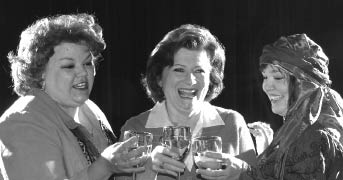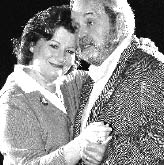The Sisters Rosensweig
by Anthony Chase

Wendy Wasserstein’s play, The Sisters Rosensweig, was a hit before it even opened back in 1992. Wasserstein had already won a Pulitzer Prize for The Heidi Chronicles and had endeared herself to New York audiences with her insightful and uplifting comedies about upper-middle-class Jewish women navigating contemporary life. Not only did The Sisters Rosensweig expand on every beloved Wendy Wasserstein theme, it offered all-star everything: direction by Daniel Sullivan; a cast featuring Jane Alexander as Sara, Madeline Kahn as Gorgeous and Frances McDormand as Pfeni, three sisters from Brooklyn having a reunion in London after the death of their mother; Robert Klein as furrier Mervyn Kant; sets by John Lee Beatty; costumes by Jane Greenwood; and lighting by Pat Collins. On top of that, the show was at Lincoln Center. It was a total sell-out and transferred to Broadway.
On Broadway, McDormand, who had another commitment (and had received the production’s only lukewarm reviews) was replaced by Buffalo’s Christine Estabrook. Again The Sisters Rosensweig was a hit, even surviving the departure of the original Broadway cast when Michael Learned came in as Sara, Linda Lavin as Gorgeous and Joanne Camp as Pfeni. Hal Linden replaced Robert Klein as Mervyn Kant, and a then unknown Brian O’Byrne came in as Tom, the clueless boyfriend of Sara’s daughter.
With high-profile actors replacing high-profile actors, rather than seeing recreations of the original interpretations, audiences saw reinterpretations of the roles. Reviews concentrated on how Linda Lavin had tamed the goofy antics of Gorgeous, about how Joanne Camp’s Pfeni was less vulnerable than Estabrook’s, and so forth. The Jewish Repertory Theatre of WNY has similarly treated The Sisters Rosensweig as an all-star affair, populating their current production with some of Buffalo’s most highly regarded and popular actors. The production stars Barbara Link LaRou, Eileen Dugan, Kelli Bocock Natale, Saul Elkin and Tim Newell. These actors, too, under the direction of Greg Natale, reveal the characters of The Sisters Rosensweig with fresh insight.
Let us begin with Kelli Bocock-Natale. Bocock-Natale is an actress best known for her broadly comic, over-the-top, take-no-prisoners performances as characters like Sophie Tucker (The Last of the Red Hot Mammas) or Miss Crowe, the irrepressible yet entirely untalented costume designer and character actress in A Man of No Importance. One might have been concerned that she would run roughshod over Gorgeous, a character created with deft nuance by Wasserstein and given delicate effervescence by Madeleine Kahn. These fears (to which I confess) would have been unfounded, for the moment Bocock-Natale glides through the open door as Gorgeous Teitelbaum, she establishes a tone of reality, even as she imbues life into an entirely new Gorgeous. Here is a woman who has had to try too hard for everything, who struggles not to be a cultural cliché and yet succeeds in becoming a total cultural cliché. Bocock-Natale manages to use the full breadth of her comic gifts and to contain them within the truth, authenticity, and warmth of Gorgeous.
Next there is Eileen Dugan as Pfeni. This is the most difficult of the Rosensweig sisters to play as she is the most slightly written. Half Emma Goldman, half Auntie Mame, Pfeni is a former international reporter, now a travel writer, in love with a major London theatrical director who even Ted Haggard would admit is gay. Okay, bi. Whatever. Pfeni is smarter about international politics than she is with her life. Wasserstein’s characters are typically clever except when it comes to self-knowledge—one of her many affinities with Anton Chekhov, whose Three Sisters gets a wink and a nod in this play. Pfeni’s journey, over the course of the play, is to realize her strengths, move on from the failed relationship and return to her first talent. Dugan is very successful at making this work. She forges an amalgam from Pfeni’s socio-political depth and her socio-superficiality. The result is a character who is as loving and fun-loving as her totally opposite sister, Gorgeous.

The success of these portrayals, in some ways, highlights the degree to which Sara, the eldest sister, played by Barbara Link LaRou, is left out in the cold. There is a danger in this, as Sara can become so rigid as to be inhuman, and LaRou walks the line rather closely. LaRou’s Sara is a woman so strong that she has to make an effort to find her vulnerabilities. The performance, which takes a while to gain momentum, represents the major through-line of the play. All of the play’s themes zero in on Sara and her inability to reconcile her personal needs and her American-Jewish background with the rest of her life. As the hostess and birthday girl of the evening, Sara is a spectacular career success, the only woman ever to serve as the head of a Hong Kong bank. She has a daughter of her own, from a failed marriage, whose life she would like to run with banker-like efficiency. The arrival of her sisters and an unexpected furrier from New York on the eve of her 54th birthday provides the circumstance through which she can turn a critically important personal and emotional corner. LaRou accomplishes this in steady, measured fashion, allowing the pyrotechnics to revolve around her. She nails Sara’s acidly cynical jokes—about her marriage, about her daughter’s boyfriend—with nimble accuracy. Through her generous and understated performance, she lets nature and circumstances take their course.
Saul Elkin is endearing as the furrier who courts Sara and coaxes her down from her pedestal. Tim Newell is excellent as the self-absorbed theater director who uses Pfeni until he tires of her (my interpretation, not his). The cast is completed with performances by Drew Derek, Jim Maloy and Rachel Oyama.
The costumes have been handsomely designed by Ann Emo, including a critically important Chanel suit and marvelous character attire for everyone.
Others commented to me that the performance is long, but I, frankly, did not notice the time speeding by. I found the production to be wonderfully entertaining, and I found myself missing Wendy Wasserstein, who died last year at the age of 55, shortly after the opening of her final play, Third. I cherish memories of interviewing her in Seattle, where so many of her plays originated, and of telling her about seeing the original Spanish production of Las Hermanas Rosensweig. She was a bright and big-hearted person with a good word to say about everyone. Spending some time with the Sisters Rosensweig is like being in her company again. I wish there were more plays forthcoming.
|
Issue Navigation> Issue Index > v5n50: Last-Minute Holiday Gift Guide (12/14/06) > The Sisters Rosensweig This Week's Issue • Artvoice Daily • Artvoice TV • Events Calendar • Classifieds |









 Current Issue
Current Issue